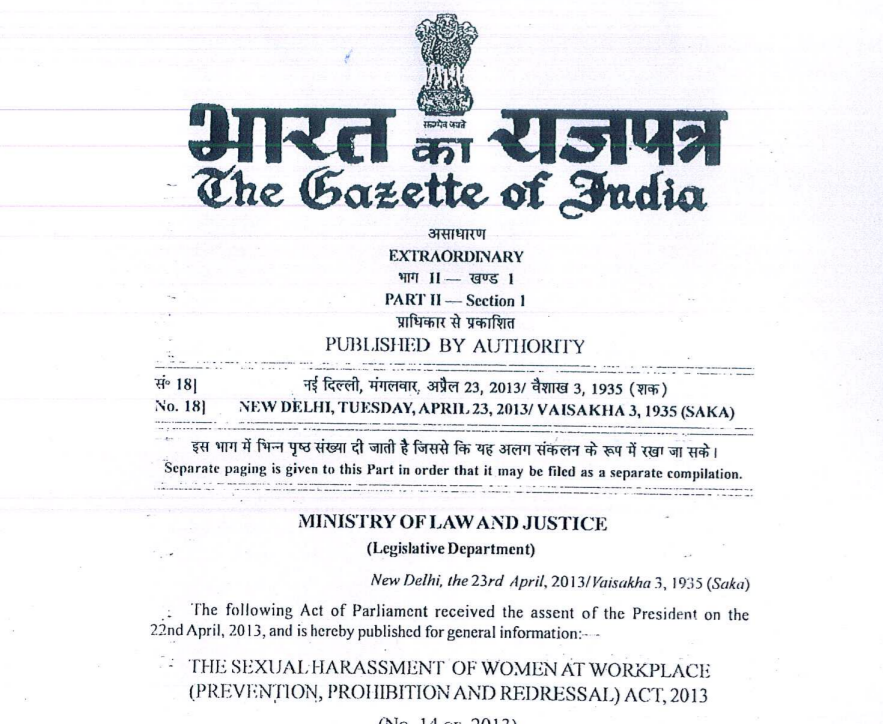1.1 What is POSH Complaint?
If a woman suffers any incident of sexual harassment at the workplace, the woman can file a written complaint with the internal committee. The incident of sexual harassment can include any unwelcome acts or behaviour (whether directly or by implication) by the respondent towards the complainant. For example, if the respondent has made any unwelcome physical contact or advances towards the aggrieved woman, then the woman can file a written complaint indicating such physical advances or contact. At times, it is being seen that the senior employees may demand or request sexual favours from a junior or other women at the workplace, the aggrieved woman can then lodge a posh complaint against such employees. If the respondent has made any sexually coloured remarks, jokes against the woman, then the aggrieved woman can file the written complaint against the respondent. If the respondent has shown pornography to the woman, then the aggrieved woman can file a written complaint against the respondent. If the respondent has made any unwelcome physical verbal or non-verbal conduct of sexual nature towards the woman, then the aggrieved woman can file the complaint against the respondent. In any case, a written complaint is a must requirement for filing a complaint under the POSH Act, 2013.
1.2 When the POSH Complaint can be filed by an aggrieved woman?
Any aggrieved woman can file a complaint of sexual harassment at the workplace with the internal committee within three months from the date of the incident. If the woman went through a series of incidents of sexual harassment, then the complaint needs to be filed within three months of the date of the last incident.
1.3 Can there be an extension available for filing the POSH Complaint?
The internal committee or the local committee can provide an extension of up to three months to the aggrieved woman to file the posh complaint if it is satisfied that the circumstances were such which prevented the woman from filing a complaint within the initial three months from the date of last incident period. However, the internal committee or the local committee has to record the reasons in writing for providing an extension of up to three additional months.
1.4 Where to file the complaint if there is no internal committee constituted at the workplace?
If the internal committee is not constituted at the workplace, then the complaint can be filed with the local committe of the district within the period of there months from the date of the incident.
1.5 The aggrieved woman is not able to file the written complaint on her own. What are the options available to file the written complaint?
If the aggrieved woman is not able to make the complaint in the writing, then the Presiding Officer or any Member of the Internal Committee or the Chairperson or any Member of the Local Committee shall provide the required support to the aggrieved woman to make the complaint in writing. In case the aggrieved woman is unable to make a complaint on account of her physical or mental incapacity or death or otherwise, her legal heir or such other person as may be prescribed may make a complaint under this section.
1.6 Who are the persons who can file the complaint on behalf of the aggrieved woman under the Posh Act, 2013?
The POSH act 2013 and rules made thereunder allows the following persons to file the complaint on behalf of the aggrieved woman.
1.6.1 If the aggrieved woman is unable to make the complaint on account of her physical incapacity:
In such a scenario, the following persons can file the complaint.
· Her relative or friend; or
· Her co-worker; or
· Any officer of the National Commission for Women or State Women’s Commission or
· Any person who knows about the incident, with the written consent of the aggrieved women.
1.6.2 If the aggrieved woman is unable to make the complaint on account of her mental incapacity:
In such a scenario, the following persons can file the complaint.
· Her relative or friend; or
· A special educator; or
· A qualified psychiatrist or psychologist; or
· A guardian or authority under whose care she is receiving treatment or care; or
· Any person who knows about the incident jointly with her relative or friend or a special educator; or a qualified psychiatrist or psychologist; or a guardian or authority under whose care she is receiving treatment or care.
1.6.3 If the aggrieved woman is unable to make the complaint for any other reason:
In such a scenario, the complaint may be filed by any person who knows about the incident, with the written consent of the aggrieved woman.
1.6.4 If the aggrieved woman is dead:
In such a scenario, the complaint may be filed by any person who knows about the incident, with the written consent of the legal heir of the aggrieved woman.

